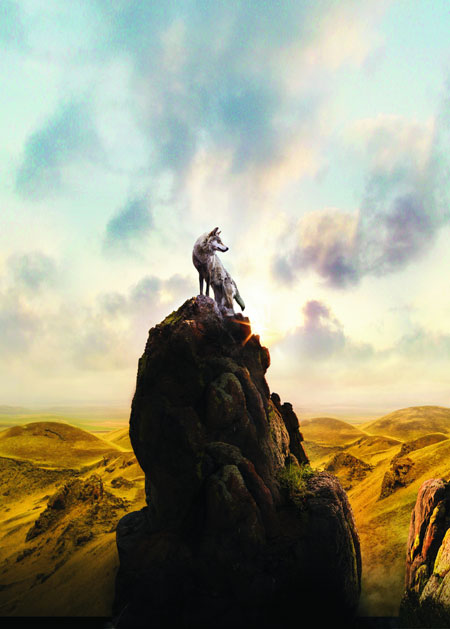
A poster of the film Wolf Totem. The film and the book of the same name have aroused controversy.
Critics have described the film Wolf Totem as a distortion of Mongolian culture, Xing Yi reports.
A prominent ethnically Mongolian Chinese writer has slammed the movie Wolf Totem, directed by Jean Jacques Annaud from France, as being inaccurate and a "distortion of our Mongolian culture".
"The wolf has never been a totem of the Mongolian people," Guo Xuebo, an ethnic Mongolian novelist and a member of China Writer's Association, wrote on his microblog on Feb 18, the day before the movie, which is based on a book of the same name, was released.
"The 'wolf totem' in both the novel and the movie is a distortion of our Mongolian culture."
Guo's post has since been shared more than 9,000 times.
The film was adapted from the semi-autobiographical novel published in 2004 by Jiang Rong, the pen name of Lyu Jiamin. It tells the story of a young Han Chinese student who was sent to work and live with the Mongolian herdsmen in the Inner Mongolia autonomous region during the "cultural revolution" (1966-76). The student gradually learns about the nomadic culture and their bond with wolves.
The vivid descriptions of the nomads and the wolves made the novel a best-seller in China. According to the Changjiang Literature and Art Publishing House, the novel has sold more than 5 million copies and has been translated into more than 30 languages. Its English version was published by Penguin Books in 2008. Penguin paid a record advance of $100,000.
In the novel, wolves are praised by the Mongolians for their teamwork, competitive spirit and for maintaining the ecological equilibrium of the prairie. Through the words of the leader in the Mongolian tribe, the writer suggests that even the troops of Genghis Khan learned their war strategies from how wolf packs hunted.
However, Guo accuses the novel and the movie of misrepresenting the place of the wolf in Mongolian culture and exaggerating its role in the ecology of the grassland.
"Wolves are evil and are regarded as the enemy of Mongolian herdsmen," he asserts.
"I studied at the Mongolian Language Institute in the 1960s and focused on Mongolian history and cultural studies in the Inner Mongolia Academy of Social Science in the 1980s. But I have never seen any written records suggesting that the wolf is a totem of the Mongolian people," Guo tells China Daily.
"The wolves are greedy, selfish, cold and cruel. To promote the spirit of the wolves is to go against humanity."
In another widely circulated review of the movie, Rasidurj, an ethnic Mongolian documentary director, shares Guo's view that the wolf has never been a totem of Mongolian people.
"The novel Wolf Totem should be categorized as a literary work which is filled with the writer's own ideals," Rasidurj wrote. "But I do praise Mr Jiang for raising public awareness of environmental protection of our grassland."
Although there is no direct historical evidence of the worship of wolves as a totem in Mongolian society, there is some evidence people revered wolves in folk customs.